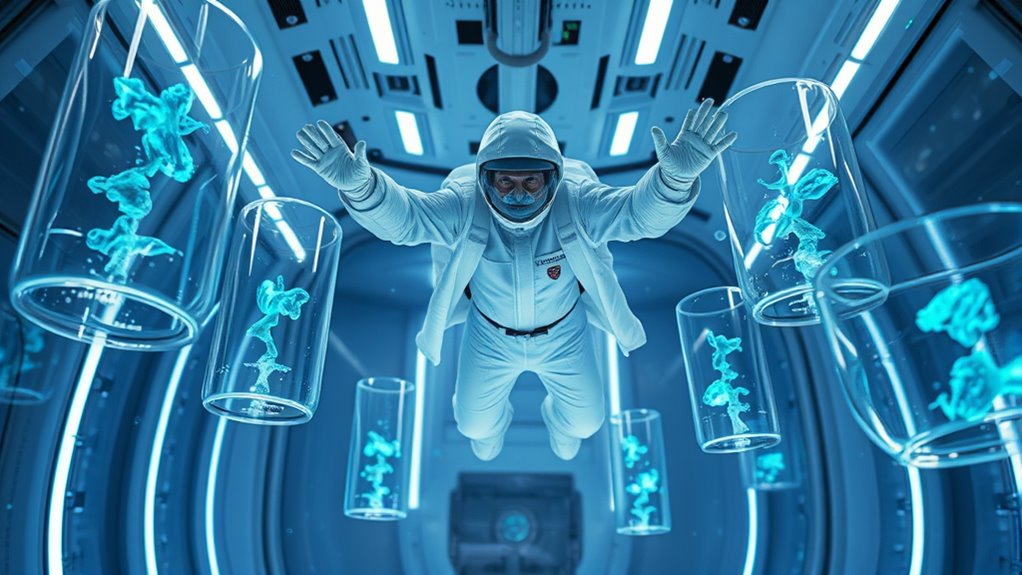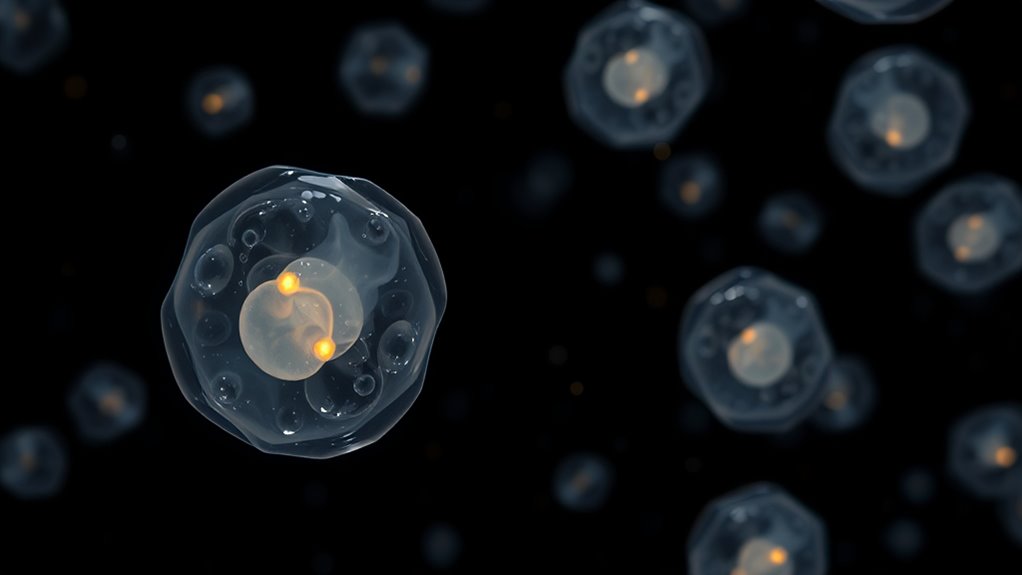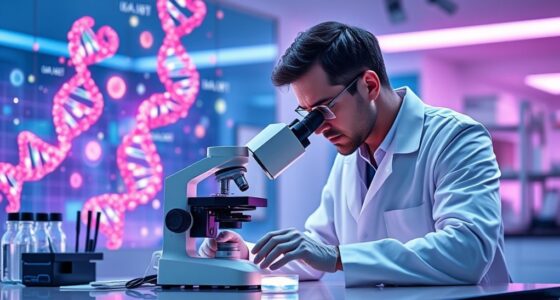In space, microgravity causes your cells to adapt by changing their structure, function, and communication. Bone cells weaken, leading to density loss, while muscle cells shrink, resulting in atrophy. Your immune system also becomes less effective, and microbes can grow more aggressively, forming stronger biofilms. These cellular shifts impact your health, but understanding these changes can help develop countermeasures. Exploring deeper reveals even more about how spaceflight transforms your body at the cellular level.
Key Takeaways
- Microgravity causes structural and functional changes in human cells, affecting their growth, communication, and resilience.
- Bone and muscle cells weaken and shrink due to reduced mechanical stress, leading to atrophy and demineralization.
- Immune system function diminishes, impairing immune responses and increasing infection susceptibility.
- Cellular responses alter medication effectiveness, necessitating dosage adjustments for space travelers.
- Space environment promotes microbial growth and biofilm formation, impacting human health and infection control.

Have you ever wondered how medicine changes in the unique environment of space? When you step into the microgravity of space, your body doesn’t just float; it undergoes significant changes, especially at the cellular level. Cellular adaptation becomes a vital process as your cells respond to the absence of gravity. Without gravity pulling everything downward, cells adjust their structure, function, and communication methods to survive and operate efficiently in this unfamiliar environment. For instance, your bone cells may weaken and lose density, while muscle cells shrink, leading to muscle atrophy. This cellular adaptation can influence how your body heals wounds, processes nutrients, and even fights off infections. Understanding these changes helps scientists develop better treatments and countermeasures for astronauts on long missions.
Microbial behavior also shifts dramatically in space. Microbes, including bacteria and fungi, thrive in the microgravity environment differently than they do on Earth. Instead of spreading out evenly, they tend to form clusters or biofilms more readily, which can make infections harder to treat. Spaceflight appears to reduce the immune system’s effectiveness, allowing these microbes to become more virulent. This means that what might be a mild infection on Earth could turn into a serious health issue for an astronaut in space. The changes in microbial behavior are closely linked to how your immune cells respond—or fail to respond—in space. Researchers have observed that bacteria grow faster and become more resistant to antibiotics, posing new challenges for medical treatment in space. Additionally, the altered immune response is a complex immune system adaptation that impacts overall health during space travel.
These cellular and microbial changes are not just scientific curiosities; they have practical implications. If your cells adapt differently, medications might need to be adjusted in dosage or formulation to be effective. The altered microbial behavior might demand new strategies for infection control during space missions. As you float in zero gravity, your body’s internal environment becomes a dynamic battlefield where cells and microbes constantly adapt to maintain balance—or struggle to do so. Understanding how space influences cellular adaptation and microbial behavior is key to safeguarding health during space travel. It also provides insights that could benefit medicine on Earth, revealing how gravity—or the lack of it—affects bodily functions at the microscopic level. In the end, studying these changes helps pave the way for safer, longer journeys into space and pushes forward our knowledge of human health in extreme environments.
Frequently Asked Questions
How Does Zero Gravity Affect Long-Term Human Health?
You might wonder how zero gravity affects your health over the long term. In space, you’re likely to experience reduced bone density and muscle atrophy because your body doesn’t need to support weight like on Earth. This can weaken your bones and muscles, increasing injury risk upon return. To counteract these effects, astronauts perform regular exercise and take medications, helping preserve their health during extended missions.
Can Space Medicine Innovations Benefit Earth-Based Healthcare?
Think of space medicine innovations as stars guiding us toward better earth-based healthcare. These advancements help develop new treatments, improve diagnostics, and enhance telemedicine. You benefit from quicker, more accurate care, and groundbreaking technologies born in space often find their way into hospitals here. Space medicine pushes the boundaries of medicine, transforming challenges in space into solutions that make healthcare on Earth more effective and accessible for everyone.
What Are the Psychological Impacts of Spaceflight on Astronauts?
You might experience psychological impacts like space loneliness and cosmic stress during spaceflight. These feelings stem from isolation, confinement, and distance from loved ones, which can lead to anxiety and depression. To manage this, you need strong mental resilience and support systems. Recognizing these challenges helps you prepare better, ensuring your well-being stays intact while you explore the cosmos, ultimately benefiting both space missions and earth-based mental health strategies.
How Do Space-Induced Cellular Changes Influence Aging Processes?
Imagine your cells as tiny factories, working tirelessly. Space-induced cellular changes, like increased oxidative stress, accelerate cellular senescence, causing these factories to slow down or malfunction. This process speeds up aging, affecting tissue repair and immune function. You might notice this as earlier onset of age-related issues. Understanding these changes helps scientists develop strategies to counteract accelerated aging caused by space environments.
Are There Risks of Developing New Diseases in Microgravity?
In microgravity, you face risks of developing new diseases due to microgravity mutations and cellular reprogramming. These changes can disrupt normal cellular functions, potentially leading to immune system issues or other health problems. While some adaptations help your body adjust, others might increase vulnerability to illnesses. It’s essential to monitor these cellular alterations closely, as they could pose long-term health risks during extended space missions.
Conclusion
As you explore the mysteries of zero gravity, you realize it’s a gentle nudge toward understanding our fragile human nature. Spaceflight’s subtle influence dances softly on your cells, offering clues to healing and resilience. Embracing these quiet changes, you see how they might guide us to healthier futures. In this cosmic journey, you’re not just a passenger but a curious traveler, learning from the universe’s tender whisper to better care for ourselves back home.









